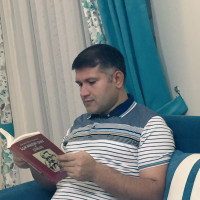Araştırma Makalesi
İnceleme Makalesi
Öğretim Uygulaması
Sayı Hakemleri


Aysel ARSLAN, Sivas-Türkiye'de doğdu. İlkokulu Sivas'ta okudu. Ortaokul ve liseyi açık öğretim programlarından tamamladı. Lisans eğitimini 2010-2014 yılları arasında Sivas Cumhuriyet Üniversitesi Türkçe Öğretmenliği Bölümünde tamamladı. Yüksek Lisans eğitimini 2014-2017 yılları arasında Sivas Cumhuriyet Üniversitesinde, doktora eğitimini 2017-2021 yılları arasında Atatürk Üniversitesinde Eğitim Programları ve Öğretim Anabilim Dalında tamamladı. 2023 yılında alanında Doçent unvanını aldı. 2017-2018 yılları arasında Gaziantep Şahinbey merkez ilçede Türkçe Öğretmeni olarak görev yaptı. 2018-2022 yılları arasında Sivas Cumhuriyet Üniversitesi Sağlık Hizmetleri MYO'da öğretim görevlisi olarak, 2022-2023 yılları arasında Sivas Cumhuriyet Üniversitesi Eğitim Fakültesi, Eğitim Bilimleri Bölümünde Dr. Öğr. Üyesi olarak, 2023 yılından itibaren Doçent olarak görev yapmaktadır. Alanında çok sayıda makale, bildiri ve kitap bölümü yayınlamıştır. Evli ve iki çocuk annesidir.



Assoc. Prof. Dr. Deniz KAYA is a faculty member at Nevşehir Hacı Bektaş Veli University, Faculty of Education. His academic interests include mathematics education, teacher training, and the integration of technology and generative artificial intelligence (GenAI) into educational settings. He conducts research on mathematical modeling, computational thinking, creative problem-solving, and the pedagogical use of GenAI to support student learning and creativity.



1988’de Mimar Sinan Güzel Sanatlar Üniversitesi, Seramik ve Cam Ana Sanat Dalı’ndan mezun oldu.
1989-1996 ve 2006-2010 yılları arasında TRT GAP Diyarbakır Radyosu ve TRT GAP Televizyonu’nda spiker olarak çalıştı. Yüzlerce program sundu. Ayrıca “Şairlerimiz ve Şiirlerimiz” adlı 13 bölümlük şiir programını hazırlayıp sundu.
1996’da Dicle Üniversitesi Ziya Gökalp Eğitim Fakültesi Güzel Sanatlar Eğitimi Bölümü’ne öğretim görevlisi olarak atandı.
2001’de Dicle Üniversitesi Sosyal Bilimler Enstitüsünde yüksek lisansını, 2009’da Gazi Üniversitesi Eğitim Bilimleri Enstitüsünde doktorasını tamamladı.
Ulusal ve uluslararası dergilerde yayımlanan çok sayıda makale ve bildirileri bulunan Doç. Dr. Evren Daşdağ, kısa bir süre, İngiltere’de bulunan De Montfort Üniversitesi Güzel Sanatlar Fakültesinde çalıştı ve orada “Anadolu’dan Esintiler (Inspiration of Anatolia)” Başlıklı kişisel sergi açtı.
“Diyarbakır Geleneksel El Sanatları” adlı iki ciltlik kitabın hem bölüm yazarlığını hem editörlüğünü yaptı.
Sanat, sanat eğitimi, sanat tarihi, doğru ve güzel konuşma, radyo ve televizyonda görüşme teknikleri, diksiyon, beden dili üzerine çeşitli seminer ve konferanslar verdi, panellere katıldı. 2021 de " Kadın Ustalarıyla (Bitlis) Kavakbaşı ve Günkırı Çömlekçiliği" isimli kitabı yayınlandı.
Yurtiçi ve yurtdışında kişisel ve karma sergilere katıldı. Eserleri çeşitli koleksiyonlarda yer aldı. Çeşitli workshoplar, sergiler ve yarışmalar düzenledi.
2014 Mart Ayında Doçent unvanı alan Evren Daşdağ Halen İ.M.Ü Edebiyat Fakültesi Sanat Tarihi Bölümünde Öğretim Üyesi olarak çalışmalarını sürdürmektedir.




Dr. Fatma ERDOĞAN graduated from Anadolu University, Faculty of Education, Elementary Mathematics Education Program with a bachelor's degree in 2005. Dr. Erdoğan, 2007 yılında Eskişehir Osmangazi Üniversitesi’nde Matematik Eğitimi alanında yüksek lisansını, 2013 yılında ise Marmara Üniversitesi’nde Matematik Eğitimi alanında doktora derecesini tamamlamıştır. 2017 yılından bu yana Fırat Üniversitesi Eğitim Fakültesi Matematik Eğitimi Anabilim Dalı’nda öğretim üyesi olarak görev yapmaktadır. Dr. Erdoğan’ın bilimsel ve akademik ilgi alanları arasında işbirlikli öğrenme, üstbiliş (metabiliş), kapsayıcı matematik eğitimi, üst düzey düşünme becerileri, problem çözme ve problem kurma yer almaktadır.








Lisans Eğitimi: Sosyal Bilgiler Öğretmenliği
Yüksek Lisans Eğitimi: Sosyal Bilgiler Eğitimi
Doktora Eğitimi: Sosyal Bilgiler Eğitimi



1981 yılında Kastamonu iline bağlı Tosya ilçesinde dünyaya geldi. İlkokulu Tosya Fevzipaşa İlkokulu’nda, ortaokul ve liseyi ise Tosya Anadolu Lisesi’nde tamamladı. 1999 yılında girdiği üniversite sınavını kazanarak Karadeniz Teknik Üniversitesi (KTÜ), Fatih Eğitim Fakültesi, İlköğretim Bölümü, Sosyal Bilgiler Öğretmenliği’ne kaydoldu. 2003 yılında bölümünden birincilikle mezun oldu. Lisans mezuniyetinden sonra KTÜ Sosyal Bilimler Enstitüsü, Ortaöğretim Sosyal Alanlar Eğitimi, Tarih Öğretmenliği Programı’nda yüksek lisans eğitimine başladı. 2004 yılında KTÜ, Fatih Eğitim Fakültesi, Ortaöğretim Sosyal Alanlar Eğitimi Bölümü’ne araştırma görevlisi olarak atandı. 2006 yılında KTÜ, Sosyal Bilimler Enstitüsü, Ortaöğretim Sosyal Alanlar Eğitimi, Tarih Öğretmenliği Programı’nda “Tarih Öğretmenlerinin Çalışma Yaprakları Hakkındaki Görüşleri” adlı teziyle yüksek lisans eğitimini tamamladı. 2005 ve 2006 yıllarında aynı fakültenin İlköğretim Bölümü’nde araştırma görevlisi olarak görevine devam etti. 2006 yılında Gazi Üniversitesi, Eğitim Bilimleri Enstitüsü, İlköğretim Anabilim Dalı, Sosyal Bilgiler Eğitimi Bilim Dalı’na araştırma görevlisi olarak görevlendirildi ve doktora programına kaydoldu. YÖK’ün doktora araştırma bursunu kazanarak 2009-2010 yılları arasında Amerika Birleşik Devletleri’nde bulunan University of Illinois at Urbana-Champaign’de araştırma faaliyetlerini yürüttü. 2010 yılında “Sosyal Bilgiler Öğretiminde Çalışma Yaprakları Kullanımının Öğrencilerin Akademik Başarılarına ve Derse Karşı Tutumlarına Etkisi” adlı teziyle doktora eğitimini tamamladı. 2011 yılında KTÜ, Fatih Eğitim Fakültesi, İlköğretim Bölümü, Sosyal Bilgiler Eğitimi Anabilim Dalı’na yardımcı doçent olarak atandı. 2014 yılında doçent ünvanını aldı. 2015 yılında Kastamonu Üniversitesi (KÜ), Eğitim Fakültesi, İlköğretim Bölümü, Sosyal Bilgiler Eğitimi Anabilim Dalına doçent olarak geçiş yaptı. 2019 yılında ise aynı anabilim dalında profesör unvanını aldı. Türkiye’de sosyal bilgiler eğitimi lisans mezunu olup aynı alanda doçentliğini ve profesörlüğünü alan ilk akademisyen oldu. KÜ Rektör Yardımcılığı, Eğitim Fakültesi Dekanlığı, Lisansüstü Eğitim Enstitüsü Müdürlüğü, Tosya Meslek Yüksekokulu Müdürlüğü, Çocuk Eğitimi Uygulama ve Araştırma Merkezi Müdürlüğü, Sosyal Bilgiler Eğitimi Anabilim Dalı Başkanlığı ve ÖSYM Tosya İlçe Sınav Koordinatörlüğü gibi idari görevleri üstlendi. Sosyal bilgiler, tarih ve hayat bilgisi eğitimiyle ilgili uluslararası ve ulusal düzeyde çeşitli projelerde görev yapmış olup çok sayıda eseri bulunmaktadır. Halen Kastamonu Üniversitesi, Eğitim Fakültesi, Türkçe ve Sosyal Bilimler Eğitimi Bölümü, Sosyal Bilgiler Eğitimi Anabilim Dalı’nda çalışmalarına devam etmektedir. Evli ve iki çocuk babasıdır. Yabancı dili İngilizcedir.










Amaç ve Kapsam
Journal of Computer and Education Research (JCER) (ISSN 2148-2896) is an international open access peer-reviewed journal. In order to reveal the knowledge of computer and education world scientifically, JCER includes qualitative and quantitative studies about educational sciences and all the areas of field education, meta-analysis studies which inclusively evaluate the body of literature, model proposals and similar authentic writings. Besides, current studies which use advanced research/statistical methods and techniques are given priority. In addition to the studies’ competence in terms of methodology, it is also the main publishing criterion to present an original and new contribution to the field.
In accordance with this general purpose, by publishing the qualified research results on education JCER aims at being a qualified source of information for researchers who produce information about computer and educational sciences and practitioners who use the produced information
JCER is an international standard peer-reviewed journal which is published in order to reveal the knowledge in the education field of computer and education world and to deal with them with a scientific way. It considers the articles which are related to pre-school, elementary school, secondary school, high school, university and postgraduate education subjects, which investigate the problems related to computer and education world, which propose solutions, and which include development/innovations and have qualities for the profession.
Adult Education; Art Education; Biology Education; Chemistry Education; Collaborative and Group Learning; Democracy Education; Democratic Citizenship And Human Rights Education; Distance Education; Early Childhood Education; Education and Culture; Education Management and Planning; Education Psychology; Education Technology; Environmental Education; E-Learning; First Literacy Education; Foreign Language Education; Geography Education; Health Education; History Education; Instructional Design; Lifelong Learning; Mathematics Education; Multicultural Education; Music Education; Philosophy Education; Physical and Sports Education; Physics Education; Program, Learning and Teaching in Higher Education; Program, Learning and Teaching in Preschool Education; Program, Learning and Teaching in Primary Education; Program, Learning and Teaching in Secondary Education; Psychological Advice and Guidance; Psychology Education; Quantification and Consideration; Science Education; Social Studies Education; Sociology Education; Special Education; Teaching and Learning Technologies; Teacher Training; Thinking Education; Turkish Education; Vocational Technical Education; Web-Based Learning Platforms
Yazım Kuralları
Journal of Computer and Education Research is an international academic refereed journal accepting educational articles in all social and science fields. It started to be published in 2013 and is featured two times in a year in April and December. Our journal is indexed in“TR Dizin, Index Copernicus, DRJI, Cite Factor, OAJI, The Norwegian Register for Scientific Journals, Series and Publishers(NSD), NewJour, Research Bible, Academia Social Sciences Index (ASOS), Turkish Education Index, Academic Index, SCIPIO, Academic Keys and Scientific Indexing Service”. By publishing original research papers, it aims to be a qualified source of data for researchers who study on computer and educational sciences and people who use this data. To gather all the experiences in the education field of the computer and education world, JCER accepts quantitative and qualitative studies in all the fields of educational sciences and of field education, meta-analysis studies comprehensively reviewing the related literature, model suggestions and other similar original writings. Also, special priority is given to up-to-date studies using advanced research/statistical methods and techniques. Besides the methodological efficacy of studies, original and new contributions to the field are also among the basic criteria for the publication of a study.
Articles sent to the journal are evaluated in a double-blind system. Journal accepts articles in Turkish and English.
Articles whose full papers are in Turkish must have abstracts both in Turkish and English.
Articles whose full papers are in English must not have abstract in Turkish.
Articles sent for publication in the journal are first evaluated by the editor, and if approved, they are sent to two referees, who are university faculty members expert in the related field. The referees are asked to evaluate the articles in 30 to 45 days. In line with the views of the referees, the editorial board decides whether to publish or reject the article. Then, the author is contacted and informed about the process.
1. The text should start with “Introduction”, which includes the purpose, scope, the related approaches in literature and the method applied in the study. At the end of the text, there should be “Discussion and Conclusion” part in which the findings obtained are presented and “Suggestions” if there are any.
2. All the paragraphs in the main text should start with an indentation of 1,25 cm. Including the notes and references, the font-size should be 11, and the font-character be Palatino with a line-space of 1,5. The text should be placed on the page with a space of 3cm on the left, 2 cm on the right, 4 cm from the top and 3 cm from the bottom without giving any page number.
3. The Turkish title of the article should be written in bold-type using the font-size of 14; the font-character of Palatino; 15 words at most and all with capital letters; aligned in the middle; and followed by an English title written in bold-type using the font-size of 12; the font-character of Palatino; aligned in the middle; and all the words only with the initial letters being capital. Just below the English title, the names of the authors should be written in bold-type using the font-size of 12 and the font-character of Palatino aligned in the middle.
Note with a number (1) should show the writer’s corporate address and note with a star (*) should show corresponding authors e-mail address. Titles and status shouldn’t be mentioned.
The Turkish and English abstracts should be placed under the names of the authors. The abstracts should be written using the font-size of 10 and the font-character of Palatino, aligned on both sides. One-line space should be left under the abstract, and at least 3 and at most five keywords should be written.
4. Figures, pictures, graphics and charts should be numbered in order, and the order should be mentioned; titles should be written over where it is necessary for the text. If they are cited, the reference should be given as footnotes.
5. The names of the tables and figures should be written in bold-type using the font-size of 10 and the font-character of Palatino, aligned on the left. The writings in the tables and figures should be in font-type of 10 with the font-character of Palatino. Horizontal lines should be used for the table demonstration.
6. The text to be sent should be typed using the word processor of Ms Word.
7. While giving references in the text, the APA 7 style, one of the common methods of citing references in social sciences, should be used. It is the authors’ responsibility whether the references are correct or not. The notes and references should be separated. If there are any notes, they should be numbered in the text and placed at the bottom of the page in order.
8. In studies sent to the journal, special attention should be paid to language use in terms of spelling, punctuation, grammatical accuracy, clarity, comprehensibility and so on. Therefore, the author is responsible for any problems and criticism likely to occur.
The texts sent to JCER should be written using the American Psychological Association (APA) style while giving the references and footnotes
JCER Reference Examples
If you are thinking about sending articles to our journal, we suggest you read the publishing policy and author guide in the about the journal section. Writers must register in the system before submitting their articles. After the registration, they can start the submission process which has five steps. Readers are suggested to register in article notification service. This process can be started by clicking the register button from the upside of the journal home page. Readers who registered in this system will get the contents of each new issue via e-mail. As stated in the privacy policy of the journal, personal information and e-mail addresses of the writers will definitely not be used for other purposes. We suggest the research libraries join this journal in their electronic source collection. It should be mentioned that open source publishing system of the journal can be proper for the academicians who use the library. More information about open source publishing system can be found on the web page of Public Knowledge Project. Writers can release their articles which are published in this journal in their personal websites or institutional archieves before and after the publication by referencing the journal. This journal provides instant access to its articles because of adopting the belief that releasing the academic studies to the community without any charge will increase the global share of the knowledge. The stage of copy arrangement aims to develop the fluency, clarity, grammar, word choice, and structure of the article. This is the last chance for the writer to make significant changes in his/her article because there will only be editing on typesetting and form of the article in the next stage. As the article which is ready for copy arrangement is in MS Word or .rtf format, it can be easily prepared as a word processing document. Two methods are suggested here. The first one is using the “track changes” feature of the MS Word. However, if this method is chosen, writer, copy editor, and editor must be able to have access to the software. The second suggested method is not related with a software and was taken here with the permission of Harward Educational Review. Journal editor can change these instructions and make them more proper for the operation of the journal.
Copy arrangement systems
1. When the “tracking changes” feature of the MS Word in the tools of the menu bar is activated, copy editor can make the changes which are thought necessary. The texts s/he adds can be seen in a different colour while the texts s/he removes from the article are seen as strikethrough, coloured, or deleted in the page margin. Copy editor can write the sentences which s/he wants to ask the writer or editor between square brackets. The article edited by the copy editor is uploaded in the system to be sent to the editor. Editor reviews the article and asks for writer’s opinions. The editor can change the editing they think are proper in a normal form by conforming them, they can change or make new additions or extractions in a different colour if they desire. If there are questions between square brackets, the writer and editor should answer them in these brackets. After the editors’ and writers’ checking up, copy editor reviews the article as a last time and confirms the changes. Then, the article gets ready for the page order and typesetting. 2. Instructions to make electronic arrangements in the article draft by using Harward Educational Review. While making electronic arrangements in the draft article, follow these steps: Responding to the suggested changes İf you are confirming the suggested changes, change the text to the normal font from bold. If you do not confirm the suggested changes, write the original sentences again and make it bold. Adding or removing texts: Mark your additions by making them bold. Write the extractions between squared brackets as in the examples: [ extracted texts]. If you are removing one sentence or more than one, write a note in the related part: Example; [ 2 sentences removed: extracted text]. Answering the question directed to the Writer: Do not do treat any way or not delete the question directed to the writer, leave them bold in the text. Write your answer at the end of the question as in the example: [ writers note: method is broadened as you suggested]. Making comment: use the comment part to explain the arrangement of the article or high amount of changes: Example; [comment: the paragraph above moved here from page 5]. Note: while numbering the pages, use page numbers which are in the printed copy sent you. Page numbers can change in the process of electronic operations.
An example of the electronic arrangement
First copy editor document: The copy editor of the journal add a question to be directed to the writer in the necessary points after reviewing the text for fluency, clarity, grammar, word choice, and form. Then, uploads the article to the journal web page and sends a note to the writer asking him to check the article.
• Writer arrangement copy: before making significant changes about the form and layout of the article whose first arrangement completed, the writer should get the editor’s thoughts. S/he should answer all the questions directed to him/her by confirming or refusing the suggested changes. After completing this process, writers should change the document name to the WriternameQAR.doc from WriternameQA.doc (example: LeeQA.doc instead of LeeQA.doc) and upload the document to the journal website.
• Last copy arrangement: Copy editor of the journal will confirm the writer’s changes and prepare the last copy by unifying the answers and the text. S/he will alert the page layout editor to complete the forming process after uploading the last copy to the journal webpage.
Etik İlkeler ve Yayın Politikası
The following ethical duties and responsibilities are written in the light of the guide and policies made by Committee on Publication Ethics (COPE).
Ethical Responsibilities of Authors
The authors who submit their manuscripts to JCER are expected to comply with the following ethical responsibilities:
• Author(s) must submit original studies to the journal. If they utilize or use other studies, they must make the in-text and end-text references accurately and completely.
• People who have not contributed to the study at the intellectual level should not be indicated as author.
• If the manuscripts submitted to be published are subject of conflicting interests or relations, these must be explained.
• During the review process of their manuscripts, author(s) may be asked to supply raw data. In such a case, author(s) should be ready to submit such data and information to the editorial and scientific boards.
• Author(s) should document that they have the participants' consent and the necessary permissions related with the sharing and research/analysis of the data that are used.
• Author(s) bears the responsibility to inform the editor of the journal or publisher if they happen to notice a mistake in their study which is in early release or publication process and to cooperate with the editors during the correction or withdrawal process.
• Authors cannot submit their studies to multiple journals simultaneously. Each submission can be made only after the previous one is completed. A study published in another journal cannot be submitted to JCER.
• Author responsibilities given in a study (e.g.: adding an author, reordering of author names) whose review process has begun cannot be changed.
Ethical Responsibilities of Editors
The editor and field editors of JCER should hold the following ethical responsibilities that are based on the guides "COPE Code of Conduct and Best Practice Guidelines for Journal Editors" and "COPE Best Practice Guidelines for Journal Editors" published as open Access by Committee on Publication Ethics (COPE).
General duties and responsibilities
Editors are responsible for each study published in JCER. In this respect, the editors have the following roles and responsibilities:
• Making efforts to meet the demand for knowledge from readers and authors,
• Ensuring the continuous development of the journal,
• Managing the procedures aimed to improve the quality of the studies published in the journal,
• Supporting freedom of expression,
• Ensuring academic integrity,
• Following the procedures without making concessions on intellectual property rights and ethical standards,
• Being transparent and clear in issues that require correction or explanation.
Ethical Responsibilities of Reviewers
The fact that all manuscripts are reviewed through "Blind Review" has a direct influence on the publication quality. This process ensures confidentiality by objective and independent review. The review process at JCER is carried out on the principle of double blind review. Reviewers do not contact the authors directly, and the reviews and comments are conveyed through the journal management system. In this process, the reviewer views on the evaluation forms and full texts are assigned to the author(s) by the editor. Therefore, the reviewers doing review work for JCER are supposed to bear the following ethical responsibilities:
Reviewers must
agree to review only in their subject of expertise.
review in an unbiased and confidential manner.
inform the editor of the journal if they think that they encounter conflict of interests and decline to review the manuscript during the review process.
dispose the manuscripts they have reviewed in accordance with the principle of confidentiality after the review process. Reviewers can use the final versions of the manuscripts they have reviewed only after publication.
review the manuscript objectively and only in terms of its content and ensure that nationality, gender, religious and political beliefs, and economic apprehension do not influence the review.
review the manuscript in a constructive and kind tone, avoid making personal comments including hostility, slander and insult.
review the manuscript they have agreed to review on time and in accordance with the ethical rules stated above.
ipts they have reviewed in accordance with the principle of confidentiality after the review process. Reviewers can use the final versions of the manuscripts they have reviewed only after publication.
review the manuscript objectively and only in terms of its content and ensure that nationality, gender, religious and political beliefs, and economic apprehension do not influence the review.
review the manuscript in a constructive and kind tone, avoid making personal comments including hostility, slander and insult.
review the manuscript they have agreed to review on time and in accordance with the ethical rules stated above.
Unethical Behaviour
Should you encounter any unethical act or content in JCER apart from the ethical responsibilities listed above, please notify the journal by e-mail at jcer.editor.in.chief@gmail.com
Cite: http://egitimvebilim.ted.org.tr/index.php/EB/pages/view/guideForAuthors#ethicalResponsibilitiesOfPublisher
Ücret Politikası
Yükseköğretim Kurulu’nun 07.03.2019 tarihli Genel Kurulunda alınan kararı (https://www.uak.gov.tr/DuyuruBelgeleri/2022/yagmac%C4%B1-saibeli-dergiler-hk-duyuru-25012022.pdf ):
“Yükseköğretim Kurulu’nun 07.03.2019 tarihli Genel Kurulunda alınan karar gereği, 07.03.2019 sonrası yayımlanmış makaleler için geçerli olmak üzere; makale kabulünden sonra yayımlanması için yazardan ücret veya ek ücret talep eden dergiler (yağmacı / şaibeli dergiler), bu ilişkinin bir çıkar çatışması içermesi nedeniyle doçentlik başvurularında (beyannamede) kullanılamaz.” açıklaması kapsamında dergimize makale başvurusu sırasında kabul/red şartına bağlı olmaksızın makale işlem ücreti alınmaktadır. Ancak bu ücretin ödenmesinin makalenizin kabul edilmesi anlamına gelmediğini hatırlatmakta yarar var..
Gönderilen çalışmaların işlenmesi ve izlenmesi sürecinde maliyetleri karşılamak için ön değerlendirme, editörlük inceleme, dil kontrolü hizmeti, sekreterlik, yazım imla, APA kaynakça kontrol, mizanpaj kontrol vb. nedenlerden dolayı ücret talep etmekteyiz. Bu sebeple gerekli ücreti ödenmeyen makalelerin süreci başlamayacaktır.
Gönderim ücreti ödenip onaylandıktan sonra makaleler, alanı ile ilgili editöre atanır ve kör hakemlik değerlendirme süreci başlar. Göndereceğiniz makale işlem ücreti hesap bilgisine Gönderi Hazırlık Listesinden ulaşabilirsiniz. Ücret yatırıldıktan sonra info.jcer@gmail.com mail adresine makalenizin ID numarasını belirleterek bilgilendirme yapılmalıdır.
Bu eser Creative Commons Atıf 4.0 Uluslararası Lisansı ile lisanslanmıştır.
Değerli Yazarlar,
JCER dergisi 2018 yılından itibaren yayımlanacak sayılarda yazarlarından ORCID bilgilerini isteyecektir. Bu konuda hassasiyet göstermeniz önemle rica olunur.
Önemli: "Yazar adından yapılan yayın/atıf taramalarında isim benzerlikleri, soyadı değişikliği, Türkçe harf içeren isimler, farklı yazımlar, kurum değişiklikleri gibi durumlar sorun oluşturabilmektedir. Bu nedenle araştırmacıların tanımlayıcı kimlik/numara (ID) edinmeleri önem taşımaktadır. ULAKBİM TR Dizin sistemlerinde tanımlayıcı ID bilgilerine yer verilecektir.
Standardizasyonun sağlanabilmesi ve YÖK ile birlikte yürütülecek ortak çalışmalarda ORCID kullanılacağı için, TR Dizin’de yer alan veya yer almak üzere başvuran dergilerin, yazarlardan ORCID bilgilerini talep etmeleri ve dergide/makalelerde bu bilgiye yer vermeleri tavsiye edilmektedir. ORCID, Open Researcher ve Contributor ID'nin kısaltmasıdır. ORCID, Uluslararası Standart Ad Tanımlayıcı (ISNI) olarak da bilinen ISO Standardı (ISO 27729) ile uyumlu 16 haneli bir numaralı bir URI'dir. http://orcid.org adresinden bireysel ORCID için ücretsiz kayıt oluşturabilirsiniz. "









